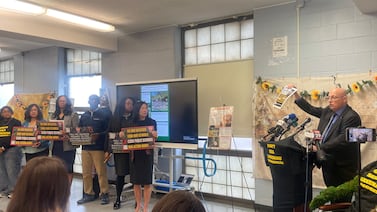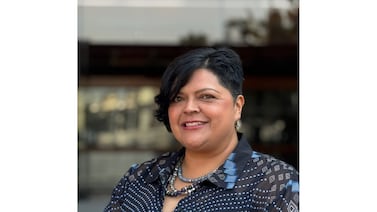Sign up for Chalkbeat Philadelphia’s free newsletter to keep up with the city’s public school system.
Applying to Philadelphia’s free preschool options may soon be much easier.
Mayor Cherelle Parker has announced two initiatives designed to get more students enrolled in the city’s free early childhood education programs and help retain teachers in the field.
Starting June 3, parents and caregivers will be able to use one simplified application portal to sign up for the city’s free public preschool programs — a big change from the current process, which families have found to be onerous and confusing.
Parker also announced she’s allocating $3 million for signing and retention bonuses for some early childhood teachers who stay in their jobs for the upcoming school year. Lead teachers will be eligible to get up to $2,000, and assistant teachers will be eligible for up to $1,500.
In a statement following the announcement, Parker said the city will also be offering summer training for teachers “providing them the tools needed to support children facing ongoing trauma, and mental and behavioral challenges.”
These city investments in the childcare sector come at a crucial time. Early childhood providers have said their industry is in crisis with the end of federal COVID aid looming and a worsening teacher shortage.
An estimated 50% of early childhood educators surveyed across the commonwealth said last year they were “unsure” or “intending to not be working in their jobs in five years,” according to a report from Start Strong PA, a statewide early education advocacy group.
Parents and caregivers have told Chalkbeat the city’s free pre-K options are life-changing, offering high-quality childcare and learning opportunities for thousands of 3- and 4-year-olds. But the application process has been a barrier preventing many families from signing up.
“I hate unnecessary bureaucracy,” Parker said at a citywide “playdate” event at Smith Playground on Saturday. “As a mother and a former teacher, I know firsthand why teachers are critical to our communities … we really do care about early childhood education providers, and we’re not just talking about babysitters, we’re talking about true, prepared educators.”
Expanding access to free preschool was former Mayor Jim Kenney’s legacy initiative. However, in Parker’s budget proposal this year, she notably recommended Philly’s pre-k programs to be funded at the same level as last year, with 17,000 seats available across the city.
Creating a teacher retention fund can be more beneficial than expanding the number of pre-K seats alone, said Elizabeth Farwell Ozer, the policy and special projects manager at First Up, an advocacy group that provides training and accreditation assistance to early childhood educators and organizations.
“Until we’ve invested in the workforce and redrafted existing programs, any money towards expansion will be futile, since there aren’t enough staff to care for the existing kids,” she said in an email.
Carly Sitrin is the bureau chief for Chalkbeat Philadelphia. Contact Carly at csitrin@chalkbeat.org.






